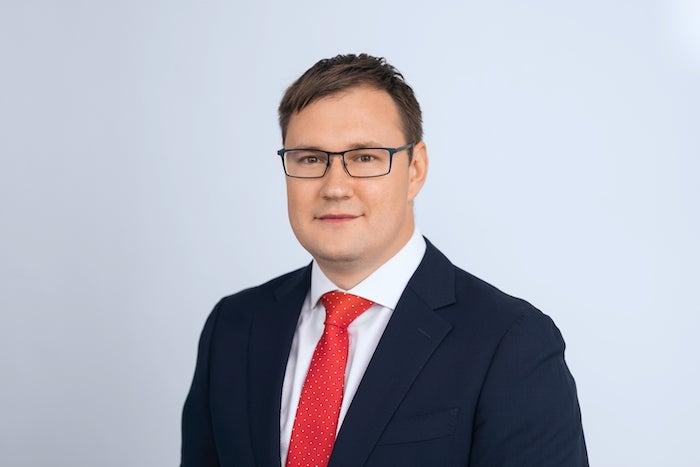NanoAvionics CCO Explains How Kongsberg Acquisition Will Help Company Scale

Linas Sargautis, NanoAvionics CCO
NanoAvionics, the highly touted, Lithuanian startup small satellite company is set to be acquired by Kongsberg Defence & Aerospace (Kongsberg) under a deal announced earlier this month. The acquisition could enable NanoAvionics to be even more of a factor on the global stage. NanoAvionics has more than 150 employees and has contributed to 120 missions and commercial satellite projects, with customers ranging from national space agencies to universities such as UNSW Sydney and companies such as Thales Alenia Space, Aurora Insight, SEN and the Dubai Electricity & Water Authority. In this interview, Linas Sargautis, NanoAvionics chief commercial officer and co-founder, explains why this was the right time for NanoAvionics to be part of something bigger.
VIA SATELLITE: Why was this the right time for NanoAvionics to be acquired? What was the rationale for the deal?
Sargautis: Our industry is becoming more mature, and naturally, it is starting to consolidate. Our customers, after proving their technologies through demonstration missions, are moving toward their constellations deployment phase, which demands higher production and operational capacity from our side. So strategically, it has been clear to us for a while that a merger with a big industry prime had to be the next step in our growth plan. And the timing for the acquisition was very convenient. We are at a point where we have an extensive small satellite product line developed, experience, and a proven track record in execution of complex end to end satellite missions. It coincided that while we were looking for partnerships to help us greatly expand, Kongsberg sought to develop small satellite capabilities.
VIA SATELLITE: How excited are you to be part of a bigger entity? What can Kongsberg bring that NanoAvionics couldn’t do on its own?
Sargautis: We are extremely excited. Kongsberg is a powerful player in the space industry with multiple decades of experience and strong positions in defence and maritime business. Many synergies between us ensure our operational capacity and company growth. For example, the KSAT network opens new possibilities for our customer constellation operations, and more doors open for our small satellite technologies to enter new markets.
VIA SATELLITE: How do you view the potential growth in the small satellite market? What do you see as the opportunity for the combined entity?
Sargautis: The small satellite market is growing fast and is becoming more mature. We have seen growing demand year after year. And we are in the market phase now, where constellations are starting to roll out by our commercial customers. Furthermore, we observe global interest in small satellite constellations from governmental institutions that see small satellites as a reliable tool to ensure critical activities such as communications and remote sensing. This picked up in the U.S., but is now a big trend across Europe and other parts of the world. Together with Kongsberg, their payloads portfolio, and KSAT ground stations network, we can further expand and make more attractive our end-to-end service offering to our customers.
VIA SATELLITE: In terms of small satellites, where do you see the most opportunity (region/vertical) where the combined company can make a difference?
Sargautis: In terms of vertical, our combined efforts will strengthen our presence in the global governmental sector. Here, Kongsberg is a very potent contractor in the maritime, defence, and space domains, where interest in small satellites has seen significant growth. Of course, we will still serve the new space industry, which is transitioning to larger satellites and their constellations, for which serial manufacturing is needed.
VIA SATELLITE: This brings together two very different companies, two different cultures. How will you look to integrate the two companies?
Sargautis: The cultural match is very important for this partnership, and we are glad that, despite the difference in size and maturity of both of the organizations, we share similar attitudes, values, and goals towards the future.
VIA SATELLITE: Was selling the company always part of your overall plan?
Sargautis: We identified the need to expand our operational capacity and advance our company’s growth a long while ago, so joining forces with a large prime has been our goal since then.
VIA SATELLITE: Finally, what is next for NanoAvionics in terms of developing new products and technology?
Sargautis: Integrating our capabilities with Kongsberg is our next step. But meanwhile, we are broadening our microsatellite offering with some new announcements on their way in the coming weeks. We are also expanding our production capacity and have just moved into our new satellite MAIT facilities in Lithuania. Here, with over 2000 square meter, we can triple our current production rate. All our global facilities are preparing to increase production as well. For that, our team is also growing rapidly – we currently have over 160 employees across the U.S., U.K. and EU, with plans to have 300 employees by the end of 2023.